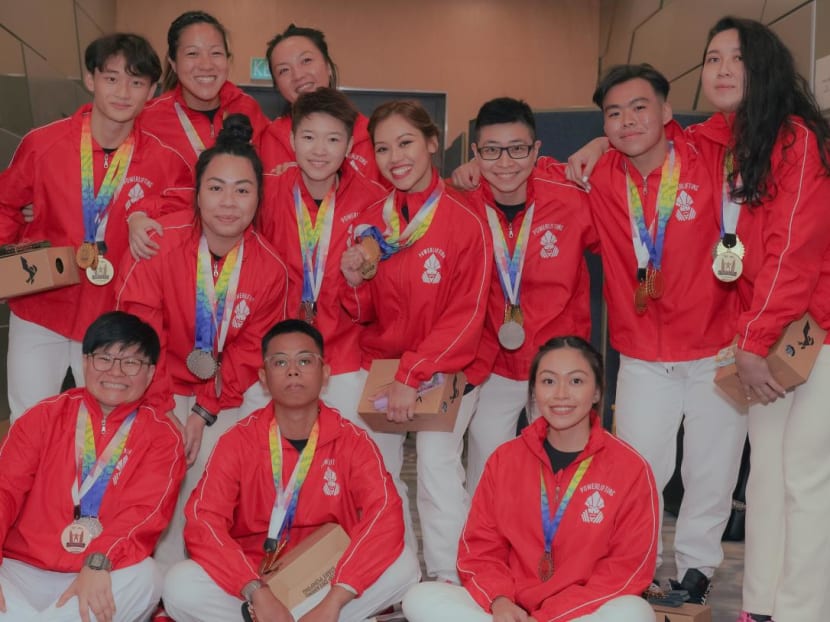7 world records in 7 years: Powerlifting fraternity hopes to ride on stellar showings to grow sport further
SINGAPORE — The local powerlifting scene aims to go from strength to strength after Singapore's best international showing in the sport at the Southeast Asian (SEA) Cup last week, when 48 local competitors bagged 26 gold, seven silver and nine gold medals. They achieved the impressive haul without any outside funding.

Part of the Singapore powerlifting team who competed at the Southeast Asian Cup, sporting the medals they won.
- Powerlifting athletes in Singapore clinched 26 gold medals at last week's Southeast Asian Cup, its best international showing, despite not getting any funding
- Powerlifting Singapore, the sport's association in Singapore, said the body has plans to grow the sport's presence locally
- This includes holding "six to seven" additional meets next year, up from just organising two annual nationals
- Athletes and referee told TODAY that the sport's achievements are fuelled by the community's passion and willpower
SINGAPORE — The local powerlifting scene aims to go from strength to strength after Singapore's best international showing in the sport at the Southeast Asian (SEA) Cup last week, when 48 local competitors bagged 26 gold, seven silver and nine bronze medals. They achieved the impressive haul without any outside funding.
The powerlifting community here hopes the success at the event, where Singapore was named best overall team, will lead to funding from sponsors. They aim to further expand the sport's presence here, just a decade after it first appeared in Singapore, with a busy schedule of domestic competitions.
Powerlifting Singapore, the sport’s association, which has been recognised by the International Powerlifting Federation since 2012, told TODAY it has big plans next year, including holding six to seven local meets leading up to its annual two nationals.
The body also hopes to grow a pool of talent involved in its technical team, and is seeking volunteers to be referees.
Powerlifting athletes and referees told TODAY that they are proud of how the sport has grown since 2012 in numbers and strength — having broken world records seven times since 2015. And for most, the growing number of women lifting weights is a source of pride.
Ms Saudi Tan, 42, a strength and fitness coach, recalled how she started powerlifting in 2015, which helped her to reignite her competitive spirit. She was one of the 21 women representing Singapore at the SEA Cup last week.
The former national rugby athlete had to retire from sports when she was unable to commit to rugby training after a career switch. Craving the adrenaline rush of competing in a sport, a friend introduced her to powerlifting.
“Powerlifting is a sport where you have a lot of flexibility in deciding when you want to train. It’s also a sport where you could do it forever if you wanted to, since there are masters one to masters four to compete in,” she said.
The International Powerlifting Federation has multiple age categories for competition. Masters one is for those aged 40 to 49, while masters four is for those above 70.
“I could even compete when I’m 80,” Ms Tan said, laughing.
“Powerlifting is a sport where you have a lot of flexibility in deciding when you want to train. It’s also a sport where you could do it forever if you wanted to...I could even compete when I’m 80.Ms Saudi Tan, 42”
When Ms Tan competed in her first competition in 2015, she recalled there were fewer than 20 women participating. Despite the small numbers, Ms Tan said the experience hooked her to the sport.
“It was intriguing watching these small-sized ladies carrying these heavy weights,” she said.
“I’m an advocate for women in sports. But not just that, seeing those who are in their 40s being able to excel in a sport is also amazing.” Twelve of the 48 athletes at the SEA Cup representing Singapore were aged 40 and above, including Ms Tan.
Mr Dylan Soh also joined the sport in 2015, after watching social media posts of feats by powerlifters around the world. While he wanted to be both a lifter and a referee, he found refereeing for powerlifting meets to be an interesting experience.
“It allows me to live vicariously through our lifters and athletes, and I am a strength and conditioning coach and sport science nerd by profession,” said the 34-year-old, who is the founder and head coach of Peak Training Lab. He is also a strength and conditioning coach at the Singapore Sport Institute.
Powerlifting may look like the Olympic sport of weightlifting, but it has its own very specific set of rules.
For example, athletes must bend their knees at a certain angle for it to be counted as a back squat, and referees will give lifters the command to press during a benchpress only when the bar is motionless while lowered to the lifter’s chest. The rules are set in a 37-page handbook used by referees such as Mr Soh.
Mr Soh, who was the former technical director of Powerlifting Singapore, said that having organised invitationals in Singapore, holding competitions here is motivation for both lifters and organisers in knowing they have the capability to achieve much, and improve more.
“The number of lifters involved in the sport has grown massively, and so did the weights on the bar increase with the bigger talent pool that we are now seeing,” he said.
“The passion from old-timers in the sport is contagious, and when you have a bigger pool of passionate people, things can happen.”
Powerlifting Singapore general secretary Daphne Loo said demand for local competition slots has grown tremendously since the group’s founding in 2012.
“At the first competition in 2012, only 12 athletes signed up. Today, we register 160 competition slots within approximately 40 minutes for our national championships.Powerlifting Singapore general secretary Daphne Loo”
“At the first competition in 2012, only 12 athletes signed up. Today, we register 160 competition slots within approximately 40 minutes for our national championships,” she said.
SEA CUP SUCCESS TESTAMENT TO SPORT'S GROWTH: POWERLIFTING SINGAPORE
The number of athletes heading for competitions overseas has also increased. Singapore has typically sent between one and three athletes, but boasted 48 competitors at the SEA Cup.
However, one factor is that the SEA Cup was held in Johor Bahru, Malaysia — this meant costs were much lower than flying to other international games. And as there is no funding, athletes, the technical team and other volunteers have to cover their own costs.
Ms Tan said that while she spent about S$1,000 to compete at the SEA Cup, including accommodation and transport, this would not cover the cost to take a plane to North America, Europe, Australia or New Zealand, where past competitions have been held.
Powerlifting Singapore president Clinton Lee said that the SEA Cup was a testament to the sport’s growth, which he hopes will spell increased recognition locally.
“It wasn’t just the athletes. We had coaches, the technical team, media crew and even medical staff who volunteered to help our athletes during the competition… It was so organised like we are a legitimate national team,” he said.
“Back when I had first competed overseas, it felt very lonely competing on my own. But now, we have achieved Best Nation, everyone was there to support each other in the community and this is a big breakthrough, proving a point that powerlifting is a sport worthy of support.”
But what is the secret to Singapore's powerlifting athletes’ international acclaim? They say it's the growing passion and willpower of everyone in the community.
“Sometimes I wonder what the younger (athletes) are eating because they break junior records left and right,” joked Mr Lee.
“But really, there is no secret. It’s willpower and just the community’s growth, where standards are constantly rising, you have a growing pool of coaches who are very competitive against each other and access to more information about how to improve yourself in the sport.”
Mr Lee added that being able to compete overseas and watch international athletes in their element also sparks his competitive spirit to constantly improve.
WHAT'S NEXT FOR POWERLIFTING?
Powerlifting Singapore said it hopes increased recognition would mean getting funding from sponsors, allowing them to hold more competitions and send athletes overseas to compete more often on the world stage.
There has been some confusion over the National Sports Association (NSA) status of Powerlifting Singapore, with the group being unclear of its status.
In response to TODAY’s queries, national sports governing body Sport Singapore (SportSG) clarified that Powerlifting Singapore is an NSA, because it has been recognised by the sport’s international federation.
It added, however, that Powerlifting Singapore has not met requirements to receive support from SportSG.
“Only NSAs that are registered charities and (that) demonstrate the required governance threshold to receive public funding are considered for the various Sport Singapore support schemes and grants,” said SportSG.
“This includes having a sound multi-year sport plan that is geared towards achieving goals that are aligned to the sporting objectives of Singapore.”
NSAs that meet SportSG's requirements are able to benefit from the One Team Singapore Fund, which matches funds that NSAs raise themselves.
This “encourages NSAs to be more resourceful in raising funds and to become more self-reliant in developing their high performance capabilities”.
While Powerlifting Singapore is not aware of its status and funding requirements, Ms Loo said: “We are also happy to oblige with the paperwork to get that done if it means that we can finally start becoming funded.
“That being said, we are happy to reopen discussions with Sport Singapore on how we can proceed to cement our NSA status, if they are open to granting it.”
She said that the association’s priorities lie in “developing the sport and helping our athletes, coaches, and referees grow”.
Its plan includes organising six or seven competitions that lead up to two national competitions next year, which will meet demand for competitions while allowing its technical team to gain more experience.
Mr Lee added: “It’s expensive to host these competitions, and our participants' competition fees simply cover overheads. Most of our volunteers help for the love of the sport.
“We hope to get sponsors and maybe gyms to host the competitions before holding our nationals in a more public setting.Powerlifting Singapore president Clinton Lee”
“We hope to get sponsors and maybe gyms to host the competitions before holding our nationals in a more public setting.”
He also plans to further improve the sport’s structure here, such as developing more ground rules and a code of conduct so that when athletes and coaches head overseas, they will reflect well on Singapore.











